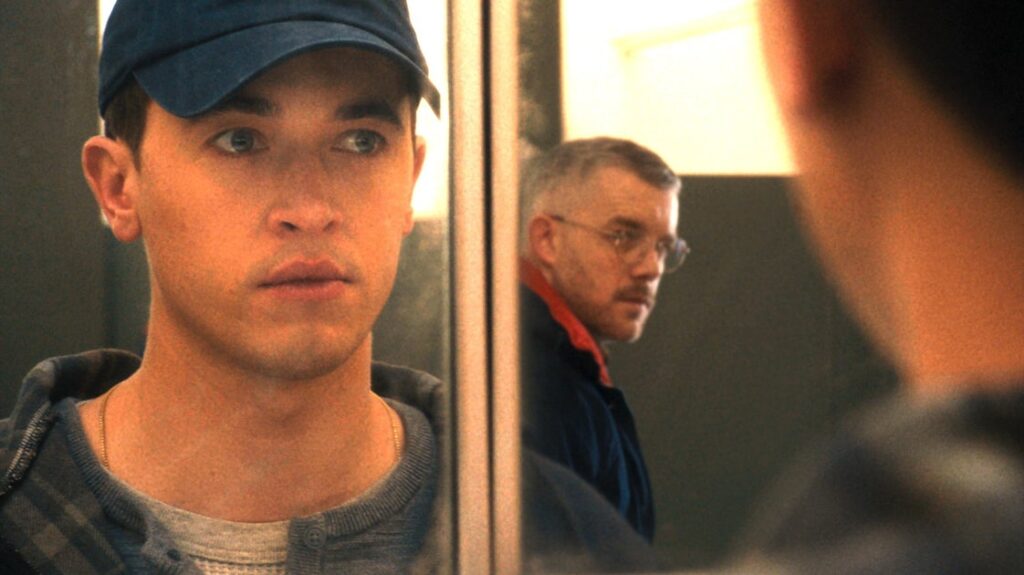After winning acclaim for portraying gay men grappling with internal conflict in “Looking” and “American Horror Story,” Russell Tovey is turning in a big screen performance in a film that, by all accounts, has become a passion project.
The British actor stars opposite Tom Blyth in “Plainclothes,” a dramatic thriller written and directed by Carmen Emmi. The movie, which premiered at the Sundance Film Festival in January and expands to theaters nationwide this month after September screenings in New York and Los Angeles, follows Lucas (played by Blyth), a police officer in Syracuse, New York, circa 1997, who leads an undercover sting operation at a local shopping mall.
Lucas is tasked with apprehending gay men who are cruising for sex in the mall’s restrooms and charging them with indecent exposure. Unbeknownst to his colleagues and family, however, he’s also struggling to come to terms with his own queer sexuality.
He soon becomes infatuated by Andrew (Tovey), one of his targets and a seemingly self-assured gay man who, as it turns out, is harboring some secrets of his own.
Emmi wrote “Plainclothes” with Tovey in mind, having been a fan of the actor’s smoldering portrayal of video game guru Kevin in “Looking.” Tovey says he was instantly captivated by Emmi’s script, describing Andrew as a “flawed, fascinating character who is kind and loving,” but also “very, very damaged.”
“As a gay man myself, growing up in a society that didn’t feel like it was built for me or welcoming or inviting for me, I carried around a lot of shame,” he told HuffPost in an interview. “I was very much in denial and trying to change my authentic self.”
“I see Andrew as someone who has a coping mechanism and an ability to not overthink the realities of the life he’s locked himself into,” he continued. “On paper, he should be a tragic character. But he finds a glimmer of happiness, peace and serenity through Lucas. What’s heartbreaking is what he does to himself, the rules that he gives himself. That’s his undoing.”

Blyth, best known to American audiences for playing Coriolanus Snow in “The Hunger Games: The Ballad of Songbirds & Snakes,” found it easy to generate on-screen heat with Tovey, noting: “We wanted to have fun with it, and we were both doing this for the right reason.”
“We had early conversations where I said, ‘Look, I want to go there. I want to be bold with this and be raw and vulnerable,’” he explained. “This film is about someone experiencing things for the first time and grappling with who they really are, even when the world around them is trying to shame them into hiding.”
In his first meeting with Emmi, Blyth said he wanted Lucas to appear “naked, both physically and emotionally” while on-screen. The film’s steamiest moment ― hailed by LGBTQ+ outlet Queerty as “the hottest movie scene of the year” ― finds Andrew and Lucas sharing a kiss in the lobby of a movie theater before heading to an abandoned greenhouse and, later, a car for a tryst.

Dave Benett via Getty Images
In rehearsals for the scene, Blyth worked with Emmi and an intimacy coordinator to come up with “a backstory for Lucas, where he’d maybe had a drunken kiss or a moment of touch with a friend that led up to this moment, his first proper experience with a man.”
“We built some tension underneath, and just let it unfold,” he said.
In some respects, “Plainclothes” is a cautionary tale about internalized homophobia and the cost of living dishonestly. And though the film is set 28 years ago, it feels strikingly relevant given the rollback of LGBTQ+ rights at the federal level. Last month, it was reported that more than 200 men were arrested at New York’s Penn Station this summer for “public lewdness” after the station’s restroom was listed as a “hotspot” on a queer hookup app. At least 20 of those apprehended were turned over to Immigration and Customs Enforcement.
Acknowledged that “we’re in a really dark time,” Tovey would like viewers to see a message of “hope” in the film’s deliberately chaotic ending.
“Is it going to get worse? Probably,” he said. “But there’s got to be hope that we will come out on the other side, because history teaches us that it’s a sliding scale. What we need now more than ever is visibility, honesty and existence being proven in art, because art is the quickest way to empathy.”
Watch the trailer for “Plainclothes” below.

